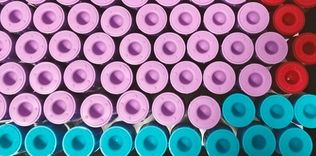On July 29, the Food and Drug Administration approved a first-of-its-kind blood test determined to be 83% effective at detecting colon cancer. Called Shield, the noninvasive test was authorized for use by people aged 45 and older with an “average risk” of the disease.
“This decision will help make screening tests more broadly accessible and propel blood-based testing and [colorectal cancer] screening into a new era,” said gastroenterologist Daniel Chung, MD in a press release. “With increased screening rates and early cancer detection, many more lives can be saved.”
Recent research indicated that Shield was most effective at finding treatable early-stage cancers, but less so at detecting precancerous growths that can be more easily spotted through a more invasive test. Because of this, the test is considered complementary to the standard colonoscopy rather than a replacement.
Colonoscopies have the distinct advantage over other tests by providing both screening and preventive services. If suspicious-looking polyps are found during the screening, they can be removed before they have a chance to develop into colon cancer. Additionally, colonoscopies are typically recommended every ten years, whereas other methods require more frequent testing.
Colon cancer is the second most common cause of cancer death in the United States… but if caught before it has a change to spread, the five-year relative survival rate is 91%.

